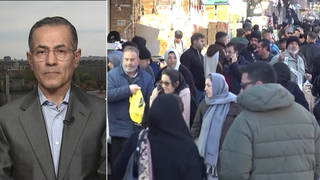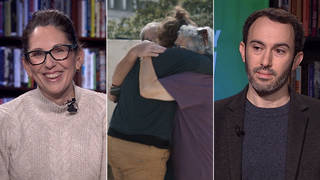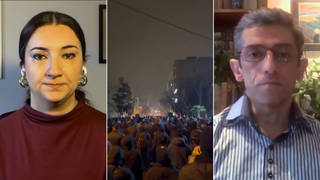
The government shutdown has brought attention to food insecurity in the United States, as it disrupted the Supplemental Nutritional Assistance Program, or SNAP, which helps about 42 million people across the country. Delayed and partial payments have occurred despite the availability of contingency funds to keep the program going during the shutdown, because the Trump administration initially chose not to use those funds. “Forty-two million Americans, 16 million of them children, are really struggling to be able to afford nutritious food for their health,” says Mariana Chilton, child hunger expert. “It’s deeply concerning.”
Transcript
AMY GOODMAN: This is Democracy Now!, democracynow.org. I’m Amy Goodman.
We turn to how the shutdown has brought attention to food insecurity and hunger in the United States. On Tuesday, the Supreme Court extended a short-term stay that allows the Trump administration to withhold full food assistance benefits under SNAP, the Supplemental Nutritional Assistance Program, until Thursday at midnight in anticipation of the end of the shutdown.
SNAP helps nearly 42 million people to eat and also to feed their children each month. Delayed and partial payments have occurred despite the availability of contingency funds to keep the program funded during shutdown, because the Trump administration chose not to use those funds and resisted a court order to do so.
The USDA, U.S. Department of Agriculture, the agency that runs the program, told states to deliver just 65% of benefits and claw back any payments beyond that. Some states have chosen to fully fund benefits in their states. The Supreme Court said withholding some funding is permissible while legal battles continue in lower courts. SNAP benefits break down to a maximum of about $10 a day per person.
At St. Mary’s Food Bank in Phoenix, patrons waited in line for 45 minutes to receive assistance. Many expressed frustration with President Trump. This is 11-year-old Sincere Miller, who was waiting with his grandmother.
SINCERE MILLER: Trump, why are you starving the kids? I’m — I’m hungry, and we have to get boxes from the food bank.
AMY GOODMAN: For more on SNAP and hunger, we’re joined by Mariana Chilton, professor of practice in the Department of Nutrition at School of Public Health and Health Sciences at the University of Massachusetts Amherst, nationally recognized leader on child hunger in America, author of The Painful Truth About Hunger in America. She joins us from Sunderland, Massachusetts.
We only have a few minutes, Professor Chilton. If you can explain what is happening now and what the Supreme Court decided and what exactly the Trump administration is doing in saying if states make up for what the federal government is not giving to hungry people, they now have to claw that money and support back from poor people?
MARIANA CHILTON: That’s an outrageous claim. What’s been happening over the past weeks has been unconscionable. And in the past week, there have been four different judge assessments about what should be done with SNAP. All of this chaos and confusion was completely avoidable and is against the law. SNAP benefits are an entitlement, and the funds are there, especially in the case of a government shutdown. So all of this was avoidable.
The Trump administration continues to break the law. The fact that there’s a stay until Thursday night, while Congress decides whether they want to come back to work or not, is — you know, the fact that they’re waiting, I can understand. They’re trying to reduce the amount of confusion. Nineteen states, including Washington, D.C., have released full SNAP benefits to their constituents. Others have released some partial funds. It’s hard to know quite what’s happening.
What is very clear that is happening is that 42 million Americans, 16 million of them children, are really struggling to be able to have — to afford nutritious food for their health and well-being and for good school performance.
So, it’s deeply concerning. And what it shows is how precarious the American people truly are. Only 50% of people in the United States have savings enough to get them through hard times. That’s why we’re seeing government workers who are not getting paid waiting in lines at the food bank. It’s unconscionable and just so wrong on so many different levels.
AMY GOODMAN: Professor Chilton, are food stamps — is SNAP the new name for food stamps?
MARIANA CHILTON: Yes, SNAP is the new name for food stamps. It means Supplemental Nutrition Assistance Program. Lots of people continue to refer to it as “food stamps” because it is a beloved program. It used to be a bipartisan darling. That’s why it’s so surprising that the Republicans have been so absent in this entire dialogue and have been actively causing harm. It’s very surprising. SNAP benefits is a way — or food stamps, as many people still call them, was a way to bring together rural communities, farming communities with urban groups, people who really need access to that food. So, it’s quite surprising that the Republicans have been causing so much harm along with the Trump administration. Again, this was something that used to have a lot of bipartisan support.
Unfortunately, this withdrawal of SNAP benefits and this cruel way of threatening states, and even threatening grocery stores, if they help SNAP recipients is a part of a long history in the United States of denying people food in order to cause chaos and also force people into submission. This is what the United States government did to Native Americans, you know, less than a hundred years ago and on beyond that. They used to starve Native Americans into submission in order to steal their land and to force them into compliance with the American government.
Finally, I just wanted to say that the right to food is extremely important in this sense. And at the climate summit in Belém, they have insisted that ending poverty and ending hunger is central to ensuring that we address the climate crisis. Food is a fundamental human right.
Many states can actually put the right to food in their constitutions. Why should we wait on the federal government, who is not abiding by the rule of law? They’re completely absent, morally corrupt. And we need to really — what’s amazing is the solidarity that’s expressed with people who are poor. I am just so energized and filled with awe at the community groups that have come together to feed their families, that farmers, Black, white, Latino and Native, have been helping their communities. And many of those farmers and farmworkers are also participating in SNAP.
So, I have lots of hope for the American people coming up with new and creative ideas, including Mayor Mamdani, who wants to have publicly funded grocery stores in the city of New York. There are wonderful new ideas emerging, and I’m just in awe of the American people coming together.
AMY GOODMAN: I want to turn to President Trump being interviewed on Monday night by Laura Ingraham on Fox.
PRESIDENT DONALD TRUMP: Well, SNAP has gone from like $7 billion to many times $7 billion. And, you know, people keep talking about SNAP, but SNAP is supposed to be veered down and out. You really, really have — that’s what the purpose of it — people, they get it, they walk in, and they get it automatically now. So, the number is many times what it should be. It’s disgraceful.
LAURA INGRAHAM: Can we — can we change that?
PRESIDENT DONALD TRUMP: You wouldn’t have been able — I’ll tell you what. This country would have been busted, 100% busted, within five months into a new administration —
LAURA INGRAHAM: Can we — can we —
PRESIDENT DONALD TRUMP: — if I didn’t win.
LAURA INGRAHAM: Can we reform SNAP —
PRESIDENT DONALD TRUMP: Yeah, I think we can reform it. I think, sure.
LAURA INGRAHAM: — and these benefits so they’re used for the people who really need them?
PRESIDENT DONALD TRUMP: It’s meant for people — and you know what it does is it really puts the country at jeopardy. People that need it have to get it. I’m all for it. But people that are able-bodied, can do a job, they leave their job because they figure they can pick this up, it’s easier. That’s not the purpose of it.
AMY GOODMAN: So, if you can explain: Are they now trying to — using this opportunity to go after people who receive food stamps?
MARIANA CHILTON: Oh, they already have been doing that. I think the Big Beautiful Bill that was passed in the summertime is already an indication of what they’re trying to do.
One thing I would like to remind Trump and his administration is that the vast majority of people who are participating in SNAP are actually, as Trump would say, down and out. That’s when I talked about the precarity of the American people, that 50% of the people in the United States don’t have enough savings to get them through hard times. Again, while his own workers are waiting in food pantry lines, he doesn’t think that people are down and out, that need actual food. So, we need to correct him.
As well, people who are able-bodied who are receiving SNAP benefits are actually already working, which I want to insist that the reason that they’re on SNAP is because their wages are far too low to support them being able to pay their rent, pay for healthcare and pay for food. That’s why so many people tell me about trading off not — they’re not eating in order to take their medicines, or they don’t take their medicine because they need to eat. This is why we have a major public health crisis.
We are at the verge of a major public health crisis with the healthcare premiums increasing. And it’s deeply concerning. This is why we need to have universal healthcare and also maybe consider if we’re going to get rid of SNAP, let’s turn it into universal basic income so people are not tied solely to being able to buy groceries, that they can spend their money as they please.
There are two major voices that are absent in this entire dialogue, and that would be the food industry. Walmart is the primary redeemer of SNAP benefits. They redeem one-quarter of SNAP benefits. And the vast majority of their workers participate in SNAP. Walmart has been completely silent in this. As well, we need to think about Amazon and also the healthcare companies that are increasing the premiums. We need to bring corporations and the government back into line and find ways we can solve — we can promote health and well-being and solve this public health crisis.
AMY GOODMAN: And finally, we just passed Veterans Day. Can you talk about veterans receiving food stamps, people who are disabled receiving food stamps?
MARIANA CHILTON: Yes. Yes, very much so. One-point-four million veterans participate in the SNAP program. The vast majority of those veterans are people with disabilities, and those disabilities were created in the combat that they were doing for the United States, mental health challenges. Forty percent of people who have disabilities in this country report food insecurity, and SNAP is a lifeline for them, because their disability benefits are not enough to help support their health and well-being.
Not only veterans, but also active-duty military. Many active-duty military families also participate in SNAP. So, we need to be able to support veterans, people who are active-duty military, families with children, seniors and people with disabilities.
AMY GOODMAN: Mariana Chilton, we thank you so much for being with us, professor of practice in the Department of Nutrition at School of Public Health and Health Sciences at the University of Massachusetts Amherst, author of the book The Painful Truth About Hunger in America.












Media Options